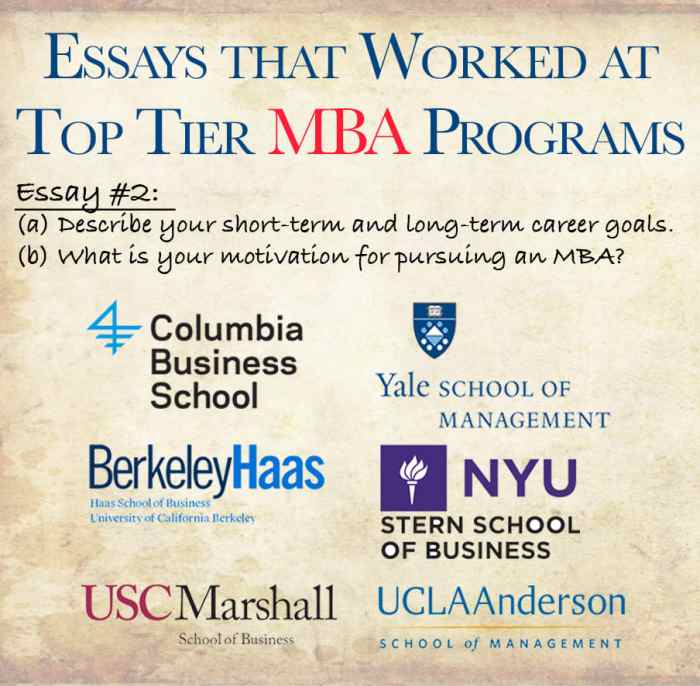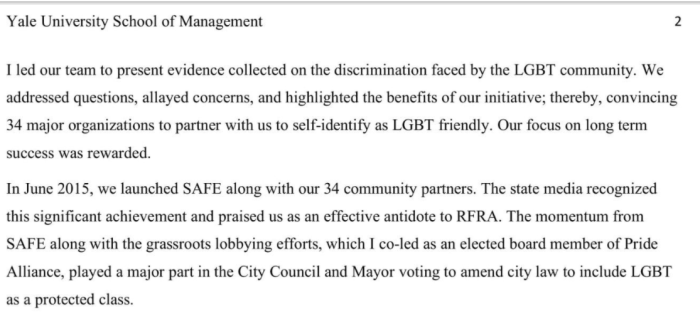How to write a compelling MBA application story is a crucial skill for aspiring business leaders. It’s your chance to showcase your unique experiences, aspirations, and the value you bring to a prestigious program. A well-crafted story goes beyond simply listing accomplishments; it paints a vivid picture of your journey, demonstrating your potential for success in the business world.
This guide will delve into the key elements of a compelling MBA application story, from understanding the admissions process to crafting a narrative that resonates with the admissions committee. We’ll explore storytelling techniques, emphasize the importance of highlighting your goals, and provide practical tips for polishing your story to perfection.
Understanding the MBA Application Story

Your MBA application story is your chance to showcase your unique journey and potential to the admissions committee. It’s not just about listing your accomplishments; it’s about weaving a narrative that demonstrates your passion, growth, and suitability for the program.
The Importance of a Compelling MBA Application Story
A compelling MBA application story is crucial for several reasons. Firstly, it allows you to stand out from the crowd. With thousands of applicants vying for a limited number of seats, a unique and engaging story can make your application memorable.
Secondly, it provides insights into your personality, values, and motivations. The admissions committee wants to understand who you are beyond your resume and transcripts. Lastly, a strong story demonstrates your ability to communicate effectively, a critical skill for success in business school and beyond.
Key Elements of a Standout MBA Application Story, How to write a compelling MBA application story
A compelling MBA application story possesses several key elements:
- Clarity and Focus:Your story should have a clear purpose and a central theme. Avoid trying to cover too much ground or introducing irrelevant details.
- Personal Connection:Your story should be authentic and reflect your genuine experiences and aspirations. Avoid generic or cliché narratives.
- Growth and Learning:Showcase your journey of personal and professional development. Highlight the challenges you faced, the lessons you learned, and the skills you gained.
- Impact and Contribution:Demonstrate the positive impact you have made on others. Share examples of how you have contributed to your community, workplace, or personal life.
- Future Goals:Clearly articulate your aspirations and how an MBA will help you achieve them. Show the admissions committee that you have a clear vision for your future.
Types of MBA Application Stories
There are several types of MBA application stories, each with its unique strengths:
- The “Overcoming Adversity” Story:This story focuses on a significant challenge you faced and how you overcame it. It highlights your resilience, determination, and ability to learn from setbacks.
- The “Passion Project” Story:This story revolves around a project or endeavor that you are passionate about. It demonstrates your commitment, creativity, and ability to make a difference.
- The “Career Transition” Story:This story focuses on a significant career change or pivot. It showcases your adaptability, willingness to take risks, and ability to learn new skills.
- The “Community Impact” Story:This story highlights your contributions to your community or society. It demonstrates your social consciousness, leadership skills, and commitment to making a positive impact.
Highlighting Your Goals: How To Write A Compelling MBA Application Story
Your MBA application story should clearly articulate your motivations for pursuing an MBA and your career aspirations. It’s crucial to demonstrate how an MBA will help you achieve your professional goals and how your specific interests align with your chosen field of study.
Articulating Your Motivations
This section requires you to present a compelling narrative that explains your reasons for seeking an MBA. Your motivations should be deeply personal and reflect a genuine desire for growth and development.
- Identify a clear and compelling reason for pursuing an MBA.This could be a desire to transition into a different industry, advance your career within your current field, or gain the skills and knowledge necessary to launch your own business.
- Connect your motivations to your past experiences.Highlight specific experiences, projects, or challenges that have shaped your desire for an MBA.These experiences should demonstrate your commitment to professional development and your ability to learn and adapt.
- Showcase your passion and enthusiasm.Your motivations should be presented with passion and enthusiasm, conveying your genuine interest in the program and your commitment to achieving your goals.
Defining Your Career Aspirations
Your application story should clearly define your career aspirations and how an MBA will help you achieve them.
- Clearly define your short-term and long-term career goals.Be specific about the roles you aspire to hold and the industries you are interested in.
- Demonstrate a realistic understanding of your career path.Show that you have researched your desired industry and understand the skills and knowledge required for success.
- Align your career aspirations with the MBA program.Explain how the program’s curriculum, faculty, and resources will support your professional goals.
Highlighting Your Specific Interests
Your application story should highlight your specific interests within your chosen field of study.
- Identify your specific areas of interest within your chosen field.For example, if you are pursuing an MBA in finance, you might be interested in investment banking, private equity, or asset management.
- Explain how your interests align with the program’s curriculum.Showcase your knowledge of the program’s faculty, courses, and research opportunities that align with your interests.
- Demonstrate your passion and knowledge.Use examples from your professional experience, extracurricular activities, or academic background to showcase your depth of knowledge and passion for your chosen field.
Polishing Your Story

Crafting a compelling MBA application story is an iterative process. Once you’ve laid out the core elements, it’s time to refine your narrative for maximum impact. This involves ensuring clarity, conciseness, and authenticity, and seeking feedback from trusted sources.
Revise and Edit
A well-polished story is clear, concise, and impactful. It’s crucial to revisit your draft multiple times, focusing on different aspects:
- Clarity:Ensure your story is easy to understand and follows a logical flow. Eliminate jargon and ambiguity, and use precise language.
- Conciseness:Every sentence should contribute to the overall narrative. Remove unnecessary details and redundant information.
- Impact:Aim for a story that resonates with the reader. Use vivid language, compelling anecdotes, and strong verbs to create an emotional connection.
Seek Feedback
Feedback from trusted mentors, advisors, or peers can be invaluable in refining your story. These individuals can provide objective insights into your narrative’s strengths and weaknesses.
- Mentors:These are individuals who know you well and can offer valuable guidance on your career goals and aspirations.
- Advisors:These individuals may be professionals in your field or experienced MBA applicants who can offer practical advice on crafting a strong story.
- Peers:Getting feedback from your peers can provide a fresh perspective and help you identify areas for improvement.
Demonstrate Authenticity and Originality
Your MBA application story should be authentic and original, reflecting your unique experiences and aspirations. Avoid generic statements and clichés.
- Authenticity:Be genuine and honest in your writing. Don’t try to be someone you’re not.
- Originality:Showcase your unique perspective and experiences. Don’t be afraid to be vulnerable and share your personal journey.
Ultimate Conclusion

Crafting a compelling MBA application story is an investment in your future. By thoughtfully showcasing your experiences, ambitions, and potential, you can create a narrative that captures the attention of admissions committees and sets you apart from the competition. Remember, your story is unique, and it deserves to be told with authenticity and passion.
With careful planning and execution, you can craft a story that not only secures your place in a top-tier MBA program but also serves as a powerful testament to your commitment to a successful career in business.
Questions Often Asked
What if I don’t have a “big” or dramatic story to tell?
Every story is unique and valuable. Focus on the lessons you’ve learned from your experiences, even if they seem small. Highlight your growth, resilience, and the skills you’ve developed. The key is to demonstrate your ability to learn and adapt, which are essential qualities for MBA success.
How long should my MBA application story be?
Adhering to the word count limits provided by each program is essential. However, don’t sacrifice the depth and impact of your story for brevity. Focus on conveying your key points in a clear and concise manner.
How can I ensure my story is authentic?
Authenticity shines through in your writing. Write from the heart and let your personality shine. Don’t try to be someone you’re not. Admissions committees value genuine stories that reflect your true self.
